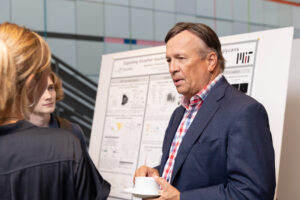Frank Laukien bets on MIT to unlock the grand challenges of glycobiology

Alumnus Frank Laukien speaks with Professor Katharina Ribbeck at the poster session. Photo: Steph Stevens
Frank Laukien ‘84, the president and CEO of Bruker, a leading manufacturer of scientific instruments, is helping facilitate the creation of a new initiative at MIT that could enable major advances in our understanding of human health and disease.
Glycobiology is the study of the carbohydrates and sugar-coated molecules that are fundamental to most basic biological functions. Understanding the structure and function of these so-called glycans is critical for understanding disease, development, immune response, and more. But it requires expertise across the biological, chemical, and even physical sciences.
To that end, Laukien is working closely with researchers across the Institute to develop an MIT initiative around glycobiology that will facilitate innovative and interdisciplinary research to crack this “sugar code of life,” as he calls it.

Alumnus Frank Laukien ’84
“This emerging field is at an inflection point,” says Laukien. “Better methods for studying glycans are becoming available, but they need further science and technological and computational innovations — all areas where MIT excels.”
Laukien’s interest in glycobiology came first and foremost through his own experience as a scientist. He graduated from MIT with an SB in physics in 1984 and went on to receive his doctorate in chemical physics at Harvard. For several years, before taking the helm at Bruker, he lectured in physics at the University of Bremen in Germany, and in 2017, he was elected to the German National Academy of Science and Engineering. Today, he is a visiting scholar at Harvard University in the Origins of Life Initiative and the Department of Chemistry and Chemical Biology.
Throughout his career, Laukien has remained a close partner of MIT, serving in the past on the Dean’s Advisory Committee for the School of Science and currently on the Chemistry Visiting Committee. He’s also been an active and enthusiastic supporter of diverse research efforts, from fighting cancer to advancing fusion energy.
Glycobiology has been an obvious area for him to focus his time and energy, both for the field’s interdisciplinary and its potential for widespread, valuable applications. Investing in fundamental science on glycans today, he says, could have enormous benefits for society in the future. Yet, it’s a field, he adds, that has been historically neglected by funding agencies and philanthropists.
“One of the functionally most important processes that occur to proteins is glycosylation, and yet there have been no good lampposts for elucidating that process,” laments Laukien. “Even with all brilliant researchers at MIT, there was no integration of capabilities or coordination to get the crucial resources and tools needed to move this work forward.”
“GlycoMIT could not be in a better place in the world to drive scientific and medical breakthroughs.”
Though Laukien’s partnership with MIT to help remedy that has been ongoing, it kicked off visibly with a symposium on Oct. 5, bringing together several researchers to discuss their work and the future of the field. Since then, he says, faculty from across the Institute have reached out, excited to get involved.
“The first GlycoMIT symposium didn’t only have intriguing talks, but the energy and enthusiasm was incredible and reflects the great scientific opportunities in a future MIT initiative in glycobiology,” he says.
There are several things, Laukien believes, that make MIT an ideal proving ground for this work, including the Institute’s close relationships with other world-class hospitals, universities, and research organizations and its location in the Cambridge, Massachusetts. biotech hub. On top of that, he points to MIT’s strengths in science, technology, and, in particular, computation, emphasizing the exciting potential of bringing computer science and math to bear on this scientific endeavor.
In short, he says, “GlycoMIT could not be in a better place in the world to drive scientific and medical breakthroughs.”
Leah Campbell | School of Science